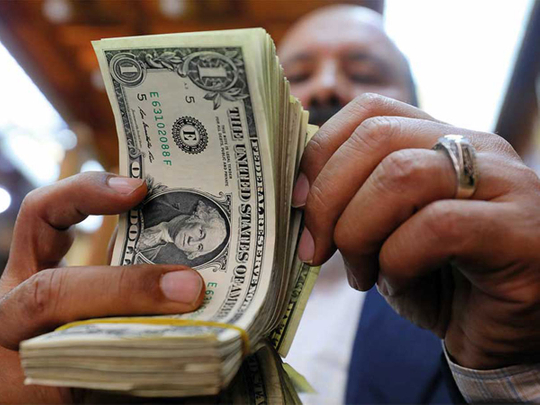
Highlights
- BoE's Bailey tells pension funds they have 3 days to rebalance.
- Market awaits Thursday's U.S. inflation data.
- Traders watching for Japan action as USD/JPY nears 24-year peak
- Aussie dollar hits new 2-1/2-year low vs US dollar.
New York: The safe-haven U.S. dollar gained broadly in volatile trading on Tuesday, adding to recent gains, after a top Bank of England official reiterated that the central bank will end its bond-buying program on Friday and told pension fund managers to finish rebalancing their positions within that time frame.
That fuelled concerns that the BoE's withdrawal could re-ignite market volatility around the world and cause financial instability.
BoE Governor Andrew Bailey said pension funds should finish rebalancing their positions by Friday when the British central bank is due to end its emergency support program for the county's fragile bond market.
Earlier on Tuesday, the Pensions and Lifetime Savings Association, an industry body, urged the BoE to extend the bond-buying programme until Oct. 31 "and possibly beyond."
Sterling drops
Sterling dropped to a two-week low of $1.0962 after Bailey's remarks, down 0.9%.
Adding to the gloom was a downbeat report from the International Monetary Fund that said countries representing a third of world output could be in recession next year. The IMF also cut its 2023 global growth forecasts further.
"The risk-off vibe will persist until we see some good news and this is all U.S. dollar-positive," said Erik Bregar, director, FX & precious metals risk management, at Silver Gold Bull in Toronto.
"I can see it propelling the dollar higher still, even though people think it's a crowded trade. But the trend is definitely dollar-bullish right now."
Inflation report
Investors are also bracing for a key inflation report later this week that is expected to show persistently strong price pressures.
Overall, dollar sentiment remained positive as worries about rising interest rates and geopolitical tensions unsettled investors, while the yen hovered near the level that prompted last month's intervention.
Strong U.S. labour market data and a high inflation forecast expectation on Thursday have all but dashed hopes on anything but high interest rates through 2023, which should drive the dollar back toward the 2002 peak hit last month.
In afternoon trading, the U.S. dollar index rose 0.2% to 113.25, not far from a 20-year high of 114.78 it touched late last month.
U.S. data due on Thursday is forecast to show that headline inflation came in at a hot 8.1% year-on-year rate in September, but down from 8.3% in August. Core inflation is expected to have risen to 6.5% from 6.3% previously.
Three-week high against yen
The dollar touched a three-week high against the yen of 145.895, just shy of the 24-year peak of 145.90 hit before the Japanese government stepped in to prop it up three weeks ago. It was last flat at 145.815 yen.
Japan chief cabinet secretary Hirokazu Matsuno on Tuesday reiterated the government's willingness to intervene, saying they will take "appropriate steps on excess FX moves".
Fear of intervention has helped the yen firm in recent weeks, but as it drifted back to multi-decade lows, analysts were keeping an eye on whether the Japanese authorities will step in again.
The euro was little changed at $0.9706, after four days of losses that have seen the currency drift toward the 20-year low of $0.9528 it touched on Sept. 26.
Britain's markets remained on edge and not exactly soothed by the BoE stepping up bond buying and UK Finance Minister Kwasi Kwarteng promising to bring forward some budget announcements.
Meanwhile, the risk-sensitive Australian dollar hit a 2-1/2-year low of $0.6248 and was last down 0.4% at US$0.6270. Analysts at the National Australia Bank said the Aussie was the market's "whipping boy" in a selloff and that further lows were possible in the near term as sentiment is fragile.
Yellen comments
US Treasury Secretary Janet Yellen said the strength of the dollar is the "logical outcome" of different monetary policy stances globally and that its value should be set by the market.
"A market determined value of the dollar is in America's interest," Yellen said Tuesday in an interview with CNBC, when asked about the possibility that authorities might need to intervene to curb its rise. "The currency movements are a logical outcome of different policy stances."
Responding to criticism that the dollar's surge threatens emerging economies, Yellen said that the greenback's strength reflects "appropriate" policies.
The Federal Reserve's most aggressive monetary tightening since the early 1980s has sent the US currency surging, impacting developing countries that borrowed heavily in greenbacks and raising the cost of dollar-priced energy and other imports.
Yellen was also asked about recent market volatility after the UK announced billions in unfunded tax cuts in an effort to boost growth, which were seen running counter to tighter monetary policy to cool inflation.
"My general view is that, and this is how I feel for the United States, is that, at a time when monetary policy is tightening, fiscal policy should have a stance that it complements that," she said.












